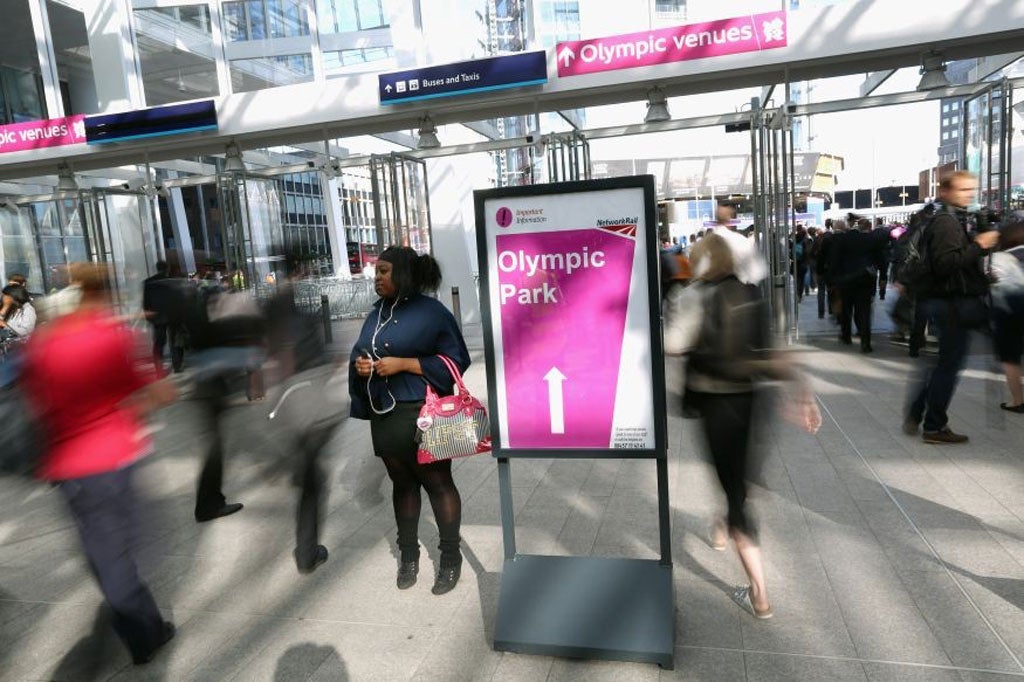Simon Calder: The fun and the Games on the Tube and trains
The man who pays his way

On paper, it looks like a recipe for disaster. London 2012 is placing more reliance on public transport than any Olympiad for decades – and much of the capital's transport infrastructure, from St Pancras station to the Metropolitan Line, is so old that it pre-dates the modern Olympic movement.
Yet despite a few hiccups such as Tuesday's fire alert on the Central Line and some routine maintenance issues, it seems to be working – and, indeed, there is much to be proud of in the way our transport providers are handling the Olympics. The front-line staff who run the capital's Tube, train and bus networks are taking the Games in their stride. They are, after all, accustomed to moving millions of people around every day, while coping with the extra pressure from big football matches when tens of thousands of fans cause a short, sharp surge in demand for transport. Stratford, the main Olympic venue, is about the best-connected place on the planet, with two high-capacity Tube lines and high-frequency Overground and Docklands Light Railway links to many parts of London and the South-east.
The big test was last Monday. Would the system survive first contact with both Olympic traffic and regular commuters? After all, travellers had long been warned that London Bridge Underground station would be "exceptionally busy all day on Monday 30 July".
This assertion works better if "exceptionally busy" is replaced by "fairly quiet". I made a point of going to London Bridge station for the first spell since the opening of hostilities when passengers were warned they would have to wait up to 15 minutes to board a service. I must have waited on the near-empty Jubilee Line platform to Stratford for up to 15 seconds – and I got a seat.
Most Tube travellers have experienced nothing but good-humoured staff and fellow passengers, and a system running smoothly with plenty of "headroom" to cope with extra spikes in demand.
The Olympics have jolted transport enterprises into doing some joined-up planning. Train operators from East Coast to East Midlands, Virgin to First Great Western and South West Trains, are laying on extra late-night services throughout the Games. After the Opening Ceremony overran, these were held for stragglers making their way back from the stadium at Stratford. People got home 20 minutes late to Leicester or Cardiff or Exeter, but they got home. (Incidentally, to speed up the next Opening Ceremony I suggest the Rio 2016 organisers deduct one medal for each athlete in the parade in excess of a dozen for each national team.)
What with National Express quietly and efficiently adding special buses from across Britain to the Games, Tube trains running in the early hours and accelerated journeys on long-distance trains on Sundays, Olympic visitors should be impressed by the nation that invented mass transit a couple of centuries ago. I suggest that when the Games are over there will be a lot of calls to "keep the Olympic spirit alive" – and maintain a coherent approach to all manner of problems, including our transport system.
How to scare away visitors
The smooth operation makes the dire warnings from the key transport organisations in London look all the more absurd. Once the Games are over, the people who made unequivocal statements about how overstretched London would be must explain themselves.
All the evidence from previous Olympiads, notably Sydney in 2000 and Athens in 2004, suggests that host cities are much quieter than usual while the Games are on, because tourists and business visitors stay away in their hundreds of thousands. Why was Transport for London so sure that 2012 would be different?
"London will be very busy during the Games," is the organisation's mantra. That view is backed up by Britain's busiest airport, Heathrow, whose website front page still cautions passengers that: "Roads and public transport in and around London will be busier than normal during the Games" – and reinforcing that warning to stay away by insisting: "There are still [hotel] rooms available but they are running out fast".
In fact, the exact opposite applies. London isn't very busy during the Games. Roads and public transport are quieter than normal. And there are plenty of hotel rooms available for the remainder of the Olympics.
These claims are not merely mystifying – they are also economically damaging. Given the months of official warnings of gridlock in the capital, no wonder every large business is keeping its people well away from London, and tourists are staying away in their millions. They are missing out on a city en fête, and Britain is losing out on a vast amount of revenue.
The Olympic Bug
As you may have read here a fortnight ago: "In a replay of the 'Millennium Bug' scares – you remember, how computers would spontaneously combust at midnight on 1 January 2000 – London is in the grip of entirely misguided fears that the capital will be overloaded with tourists and traffic."
Subscribe to Independent Premium to bookmark this article
Want to bookmark your favourite articles and stories to read or reference later? Start your Independent Premium subscription today.

Join our commenting forum
Join thought-provoking conversations, follow other Independent readers and see their replies